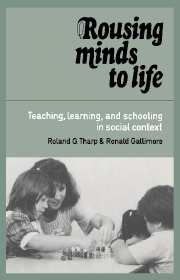Book contents
- Frontmatter
- Contents
- Acknowledgments
- Introduction
- Part I Teaching, schooling, and literacy: a unified theory of education
- Part II Practice
- 6 A school organized for teaching: the Kamehameha Elementary Education Program
- 7 The activity setting of the instructional conversation: developing word and discourse meaning
- 8 The orchestration of activity settings: learning and social interaction in the whole group and independent centers
- 9 The interpsychological plane of teacher training
- 10 Assisting teacher performance through the ZPD: a case study
- 11 The intrapsychological plane of teacher training: the internalization of higher-order teaching skills
- 12 The schools in mind and society
- References
- Author index
- Subject index
9 - The interpsychological plane of teacher training
Published online by Cambridge University Press: 05 June 2012
- Frontmatter
- Contents
- Acknowledgments
- Introduction
- Part I Teaching, schooling, and literacy: a unified theory of education
- Part II Practice
- 6 A school organized for teaching: the Kamehameha Elementary Education Program
- 7 The activity setting of the instructional conversation: developing word and discourse meaning
- 8 The orchestration of activity settings: learning and social interaction in the whole group and independent centers
- 9 The interpsychological plane of teacher training
- 10 Assisting teacher performance through the ZPD: a case study
- 11 The intrapsychological plane of teacher training: the internalization of higher-order teaching skills
- 12 The schools in mind and society
- References
- Author index
- Subject index
Summary
The pertinacious recitation script: why?
Why does the recitation script persist in the face of repeated evidence that it is insupportable on either theoretical or practical grounds? The brief answer is simply because teachers are not trained to do anything different. As we described in Chapter 4, the entire system of schooling merely directs and assesses teachers; it does not teach and support them. Schools hire teachers, drop them in classrooms, and subsequently attend to them only to perform assessment. This is wrongheaded and destructive for every member of the school community. Teaching is as crucial as any social role in contemporary life, and teachers should be held accountable and recognized for their performances through their careers. But how should this accountability and recognition be accomplished? Bird and Little (1986) point to two ways, the first conventional, and the second reformist:
Consider two views of how [accountability and recognition] might be done. In one view … teaching can be reduced to a few days of standard in-service training that teachers can implement on their own. Such teaching can be assessed with an observation form [and] the results of teaching can be checked by standardized achievement tests. Teachers are moved primarily by hope for a pension, fear that their incompetence will be detected, or respect for authority. This is a caricature of talk about teachers; as a description of behavior towards teachers, however, it is more accurate.
- Type
- Chapter
- Information
- Rousing Minds to LifeTeaching, Learning, and Schooling in Social Context, pp. 188 - 216Publisher: Cambridge University PressPrint publication year: 1989



